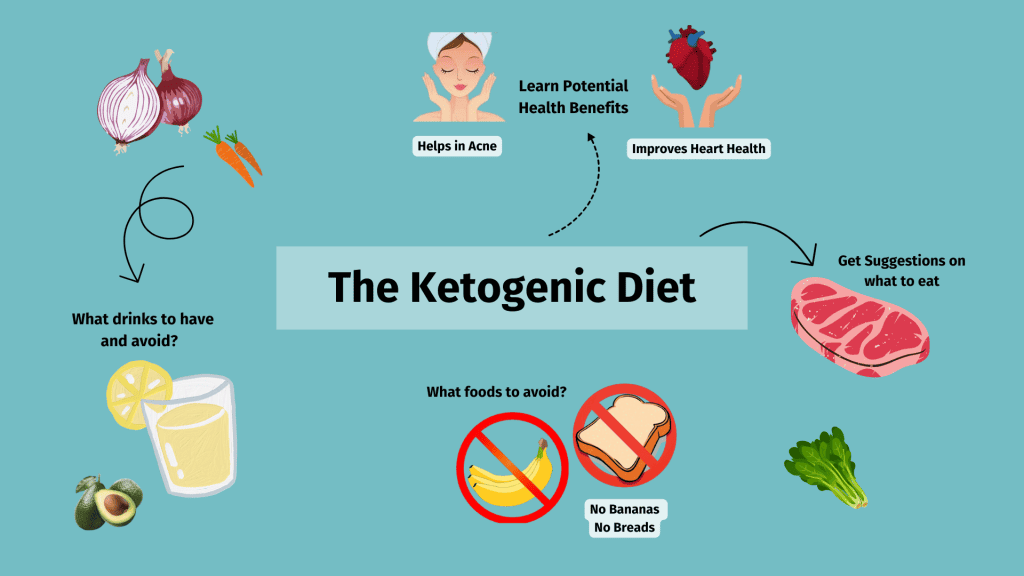5 Benefits Of Ketogenic Diet For Various Health Issues From Cancer To Diabetes
Discover the transformative potential of the ketogenic diet across health conditions, from cancer to diabetes, for improved well-being and vitality.
Unlocking Health: 5 Remarkable Benefits of the Ketogenic Diet Across Health Conditions
Introduction: The ketogenic diet has garnered significant attention in recent years for its potential health benefits beyond weight loss. From cancer to diabetes, this low-carb, high-fat diet has shown promise in managing various health conditions. Let’s delve into five key benefits of the ketogenic diet across a spectrum of health issues.
Read more: What causes Premature vascular damage?
Cancer Management and Prevention: The ketogenic diet has emerged as a supplementary approach in cancer treatment and prevention. Cancer cells predominantly rely on glucose for energy, a vulnerability exploited by the ketogenic diet, which restricts carbohydrate intake and encourages the body to utilize ketones for fuel. Research suggests that this metabolic shift can starve cancer cells, potentially slowing tumor growth and making cancer cells more susceptible to treatment. Additionally, the diet’s anti-inflammatory and oxidative stress-reducing properties may further inhibit cancer progression. While more studies are needed, preliminary evidence indicates that the ketogenic diet holds promise as an adjunct therapy in cancer management.

Type 2 Diabetes Control: For individuals with type 2 diabetes, the ketogenic diet offers a compelling approach to blood sugar management. By drastically reducing carbohydrate intake, the diet helps stabilize blood glucose levels and improve insulin sensitivity. Ketosis, the metabolic state induced by the diet, promotes fat burning and reduces reliance on glucose for energy, thereby lowering blood sugar spikes. Studies have shown that adherence to a ketogenic diet can lead to significant reductions in HbA1c levels, a key marker of long-term blood sugar control. Moreover, the diet’s weight loss benefits can further enhance insulin sensitivity, potentially allowing some individuals to reduce or eliminate diabetes medications under medical supervision.

Neurological Disorders Treatment: The ketogenic diet has long been recognized for its therapeutic potential in neurological disorders, particularly epilepsy. Originally developed as a treatment for drug-resistant epilepsy in children, the diet has since been explored as a therapeutic option for various neurological conditions, including Alzheimer’s disease, Parkinson’s disease, and traumatic brain injury. Ketones produced during ketosis provide an alternative energy source for the brain, bypassing metabolic impairments associated with these disorders. Furthermore, the diet’s anti-inflammatory and neuroprotective effects may help mitigate disease progression and improve cognitive function. While more research is warranted, the ketogenic diet represents a promising avenue for managing neurological disorders and enhancing brain health.
Read more: 5 Signs That You Are Managing Your Anxiety Well!
Cardiovascular Health Improvement: Contrary to conventional wisdom, the ketogenic diet can offer significant cardiovascular benefits when implemented correctly. While high in saturated fats, the diet typically leads to improvements in several cardiovascular risk factors, including blood pressure, triglyceride levels, and HDL cholesterol. By reducing carbohydrate intake and promoting weight loss, the diet can lower blood pressure and decrease triglyceride levels, both of which are crucial for heart health. Moreover, ketogenic diets often result in favorable changes in LDL particle size and distribution, shifting towards larger, less atherogenic particles. These findings challenge the traditional notion that dietary fat is inherently detrimental to cardiovascular health and underscore the importance of individualized dietary approaches in managing heart disease risk.
Enhanced Mental Clarity and Cognitive Function: One of the most compelling benefits of the ketogenic diet is its potential to enhance mental clarity and cognitive function. Ketones, the byproduct of fat metabolism during ketosis, serve as a highly efficient fuel source for the brain, providing a steady supply of energy without the fluctuations associated with glucose metabolism. Many individuals report improved focus, concentration, and mental sharpness when following a ketogenic diet. Moreover, ketones possess neuroprotective properties, which may help preserve cognitive function and mitigate age-related decline. While more research is needed to elucidate the long-term cognitive effects of the ketogenic diet, preliminary evidence suggests that it holds promise as a dietary strategy for optimizing brain health.
We’re now on WhatsApp. Click to join.
Conclusion: The ketogenic diet offers far-reaching benefits beyond weight loss, spanning various health conditions from cancer to diabetes. By harnessing the metabolic power of ketosis, this dietary approach has demonstrated efficacy in managing chronic diseases, improving metabolic health, and enhancing cognitive function. While further research is needed to fully understand its mechanisms and long-term effects, the ketogenic diet stands as a promising tool in the pursuit of better health and well-being.
Like this post?
Register at One World News to never miss out on videos, celeb interviews, and best reads.








